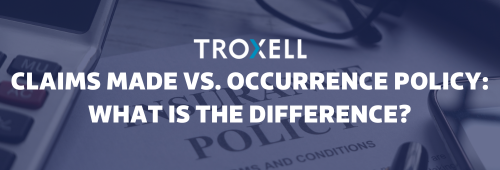
Do you know the difference between a claims made insurance policy and an occurrence insurance policy and how it can affect your coverage? A claims made insurance policy and an occurrence insurance policy are two different types of liability insurance policies. The main difference between the two is when the insurance coverage is triggered.
Definition of Claims Made Insurance Policy
A claims made insurance policy provides coverage only for claims made during the policy period, regardless of when the underlying incident occurred. This means that the policyholder must have a current policy in place when the claim is made in order for the claim to be covered.
Definition of Occurrence Insurance Policy
An occurrence insurance policy, on the other hand, provides coverage for any claims that arise from an incident that occurred during the policy period, regardless of when the claim is made. This means that as long as the incident occurred during the policy period, the policyholder will be covered even if the claim is made after the policy has expired.
Should I purchase a claims made policy or an occurrence policy?
There is no straightforward answer to which policy is better because it depends on the nature of your business and the risks involved. Generally, claims made policies are cheaper initially, but can become more expensive over time as the coverage must be maintained even after the policy expires. Occurrence policies, on the other hand, are generally more expensive initially, but provide more long-term security as coverage remains in place for incidents that occur during the policy period, even if the policy is no longer in effect.
Claims made policies are common for some policies because they offer several advantages over occurrence-based policies. Some reasons why claims made policies may be preferred for certain types of insurance include:
- Potentially lower Premiums: Claims made policies typically have lower premiums than occurrence-based policies, especially in the early years of the policy. This is because the insurer knows exactly when potential claims can be made and can more accurately assess the risk.
- Flexibility: With a claims made policy, policyholders can adjust their coverage each year to meet their changing needs. This is particularly important for professions where risks can change rapidly, such as in the medical or legal industries.
- Better Coverage Continuity: Claims made policies can provide better coverage continuity, even if the policyholder changes insurers. This is because claims made policies cover claims that are made during the policy period, even if the incident happened years earlier.
- Tail Coverage: Claims made policies can be extended with "tail" coverage or "extended reporting period" coverage, which provides protection for claims that are made after the policy has ended. This can be important for long-tail claims, such as those related to environmental or product liability issues.
Some of the insurance policies that commonly use claims made policies include professional liability insurance, directors and officers (D&O) liability insurance, and cyber liability insurance. These types of policies often involve long-tail claims, evolving risks, or frequent changes in risk exposure, making claims made policies a good fit for their needs.
Occurrence policies are common for some policies because they offer several advantages over claims-made policies. Some reasons why occurrence policies may be preferred for certain types of insurance include:
- Simplicity: Occurrence-based policies are often simpler and easier to understand than claims-made policies, which can be more complex and have more exclusions.
- Long-term Protection: Occurrence policies provide long-term protection for incidents that occur during the policy period, regardless of when a claim is made. This can be important for businesses or industries where claims can take years to emerge.
- Certainty: Occurrence policies provide greater certainty for policyholders, as they know that they are protected for any incidents that occurred during the policy period. Claims-made policies can leave policyholders with potential gaps in coverage if they do not renew their policy or purchase tail coverage.
- Price Stability: With an occurrence-based policy, the premium is typically set at the beginning of the policy period and will not change. This can provide greater price stability and predictability for policyholders.
Some of the insurance policies that commonly use occurrence-based policies include commercial general liability insurance and product liability insurance. These types of policies often involve risks that are easier to predict and where claims can take longer to emerge, making occurrence policies a good fit for their needs.
It is important to carefully review the terms and conditions of both types of policies, as well as the potential risks and coverage needs of the business, before making a decision on which policy to purchase. Reach out to your TROXELL agent to learn more! If you need to file a claim or discuss a potential claim you can reach out to a TROXELL claims representative here.
Request a business insurance quote today and work with a team who will educate, advocate and protect you.
This blog post was written by:
Ryan Augustine